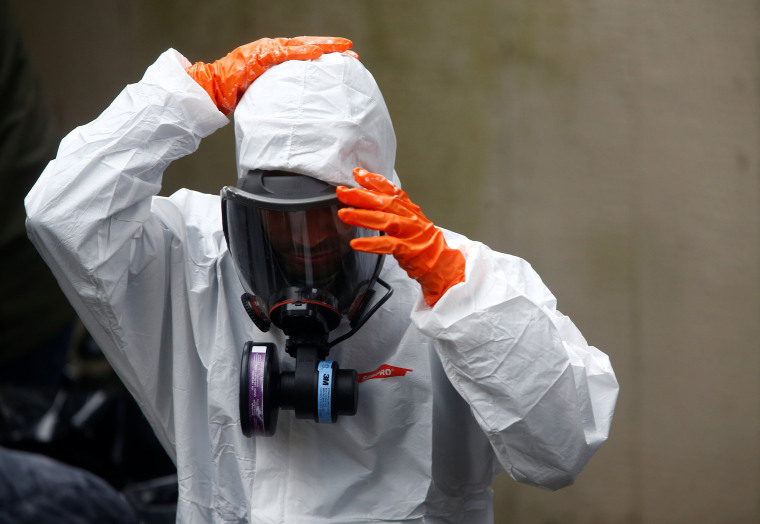WASHINGTON — DuPont, the giant biotech company, is expediting production and delivery of a product critical to protecting U.S. doctors and nurses during the coronavirus pandemic: Tyvek hazmat suits, which offer medical personnel the best protection from contracting the virus themselves.
Since the pandemic first made its way to the U.S. from China, personal protective gear for practitioners treating the virus, like surgical masks and gloves, has been in dangerously short supply. Physicians interviewed by NBC News say Tyvek suits are their most pressing need — the most effective safeguard, in combination with hats, gloves and masks, available against a virus most likely spreading through stagnant hospital air.
In contrast to standard hospital smocks, Tyvek jumpsuits are made of polyethylene fibers to provide full body coverage and repel aerosols and fluids. The suits have been widely used by medical personnel in China, where they are more easily accessible to health care workers because, unlike in the U.S., they are registered medical devices.
"It's basically a full bunny suit. You're covered head to toe. It's appropriate, and other parts of the world have done that," said Dr. Kamal Kalsi, an emergency room doctor and Army officer practicing in hospitals in New York and New Jersey.
Full coverage of the coronavirus outbreak
Dr. Peter Antevy, an emergency medicine physician in South Florida, has, in a matter of days, become a supplier of Tyvek suits. "The only way [to protect doctors] is to ramp up production of those types of suits," he said.
"People are pleading, begging, just for anything. This is how bad it's gotten," said Antevy, adding that a close doctor friend is ill and on a ventilator.
Antevy said he happened to have a contact in China who works near a plant that produces Tyvek suits. He said that since word spread that he had access to a supply of suits, his inbox "is blowing up" with messages from medical professionals and first responders seeking help.
The first shipment, which arrives from Shanghai in Miami this week, is going to the Cleveland Clinic and local hospitals, Antevy said.
"I'm a physician. I'm an EMS guy, and here I am forced to do this," he said. In Shanghai, even airport workers are using the suits.
As many workers in China return to the job, reports out of Spain and other parts of Europe suggest that thousands of doctors and nurses are still falling ill, hampering their ability to contain the virus and treat the sick. In hard-hit Italy, 20 percent of health care professionals in the Lombardy region have become infected, according to an update Friday in the medical journal The Lancet.
Many medical personnel are seeking help through social media. An emergency room nurse in Long Island, New York, has begun asking for garbage bag donations as a substitute for Tyvek suits, and there are concerns that medical staff will refuse to show up to work until proper gear is guaranteed. Antevy said he knows doctors in Colorado who are using raincoats.
Kalsi, noting the enormous "daily viral load that you accumulate day in and out" in a hospital setting, said, "A lot of these health care workers, when they get sick, they get sick really badly, even young people."
In an exclusive interview with NBC News, David Domnisch, global business director for DuPont personal protection, said the company had created a "brand new, expedited" supply chain to meet demand. The process involves flying the suits back to the U.S. from manufacturing subcontractors in Southeast Asia, instead of shipping them.
Roughly 300 pallets, or more than 350,000 suits, will flow into the U.S. national stockpile starting Friday and "continue every Friday until this ends," Domnisch said.
Domnisch said the company's plants in Richmond, Virginia, and Luxembourg are doing what they can to produce more fabric.
The suits will go to the Federal Emergency Management Agency, but Domnisch said it is unclear specifically who will receive them or when.
A FEMA spokesperson told NBC News the strategic national stockpile "will be receiving Tyvek suits from Dupont over the next 12 weeks that will be distributed across the country to areas in need of PPE for the COVID-19 response. Delivery should begin next week."
President Donald Trump has been touting how U.S. industry is stepping up to provide essentials to keep medical personnel safe. But Domnisch said DuPont is getting limited guidance from the government on how many suits are needed, based on pandemic modeling across the country.
Domnisch said DuPont is maxed out, at least in the immediate time frame, and he said the company would like to know "what the fully unconstrained demand is and then have a commitment to getting product flow to that level."
Download the NBC News app for full coverage and alerts about the coronavirus outbreak
Advocacy groups, led by the American Medical Association, say the federal government must invoke the Defense Production Act to triage among hospitals and states competing for scarce resources on the open market. That, in turn, would allow the government to prioritize supplies, including gear and ventilators, for hospitals in most immediate need.
Trump has said he intends to invoke the act but has not yet done so.
Antevy said that his hospitals isolate all COVID-19 patients on a single floor and that dedicated nurses wear Tyvek suits to tend to them, conserving suits while limiting staff exposure.

